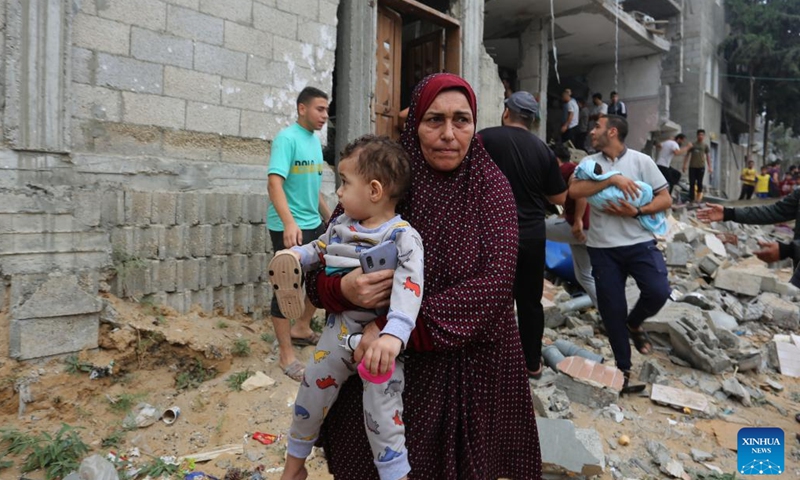
People conduct rescue work among the rubble of buildings destroyed in Israeli airstrikes in the southern Gaza Strip city of Rafah, Oct. 29, 2023. The death toll of Palestinians from Israeli strikes on the Gaza Strip rose to 8,005, including 3,342 children, the Hamas-run Health Ministry said on Sunday. (Photo: Xinhua)
After four failed attempts to come to an agreement on a resolution regarding Gaza, the UN Security Council (UNSC) met again in an emergency meeting to discuss the crisis to seek a binding resolution that demands Israel to accept a humanitarian pause in Gaza. But the US' biased backing of Israel might once again undermine international efforts to press for a cease-fire, and its connivance with Israel's excessive military actions in Gaza will exacerbate the humanitarian crisis.
The United Arab Emirates and China called for an emergency meeting of the UNSC on Monday after Israel expanded its ground operations into Gaza over the weekend, according to media reports.
During the meeting, Chinese Ambassador Zhang Jun, Permanent Representative of China to the UN, said that the Middle East peace process is on the brink of collapse and at this juncture, silence means acquiescence and inaction is tantamount to a green light.
China solemnly calls on parties of the conflict to cease all hostilities, disengage immediately, put in place a humanitarian truce, and make every effort to prevent the situation from escalating further, Zhang said, also calling on a certain major country with special influence on the parties concerned to put aside its self-interest and geopolitical considerations and make every effort to stop the war and restore peace.
The core on whether a new resolution can be passed by the Council relies on how the US chooses to act. However, given that Israel's ground operations in Gaza are still in their early stages and have not yet achieved their strategic objective, the US may not abandon its prior biased backing of Israel at the Council, Liu Zhongmin, a professor at the Middle East Studies Institute of Shanghai International Studies University, told the Global Times.
Since 1945, a total of 34 UNSC draft resolutions related to the Israel-Palestine issue have been vetoed by the US. The majority of these resolutions were drafted to provide a framework for peace in the decades-long Israel-Palestine conflict, according to Al Jazeera.
Liu noted that in recent years, disputes between powerful nations have spilled over into the UN, making it challenging for the UNSC to carry out its responsibilities on several highly contentious matters, most notably the Palestine-Israel dispute.
The US' biased backing of Israel has come under growing fire both domestically and internationally with many criticizing that the US bears responsibility for the bloodshed in Gaza. As long as the US continues its one-sided support to Israel and rejects calls for a cease-fire, its "leadership" and reputation will be called into severe doubt, some analysts noted.
At least 8,306 Palestinians have been killed in Gaza in Israeli attacks since October 7 and more than 1,400 people have been killed in Israel, media reported on Tuesday.
The number of casualties in Gaza will increase when Israel's second phase of ground operations is carried out, analysts warned.
The growing death toll is the accumulation of hostility. Israel would also be put in a more challenging position because, although it might be able to destroy Hamas temporarily, it cannot make it disappear forever. Regardless of its goals for Gaza's governance, it will never get rid of threats from Hamas or put a stop to its battle with the Palestinians, Liu said.
It would be a complete tragedy for the people of Gaza and a failure of global governance if the US' veto power causes another UNSC resolution fail, even amid the current mounting pressure for a cease-fire from the international community, Liu said.
Four resolutions were rejected in the 15-member Security Council, with the US the sole Council member to veto the Brazil-drafted resolution on October 18. On Friday, with a recorded vote of 121 in favor to 14 against, with 44 abstentions, the UN General Assembly adopted a resolution demanding a humanitarian truce in the Gaza Strip. However, UN Security Council resolutions are legally binding, while assembly resolutions are not.
Chinese Foreign Ministry spokesperson Wang Wenbin on Tuesday called on relevant parties to implement the UN General Assembly resolution, institute a cease-fire and a halt to the violence and prevent the situation from deteriorating to avoid an even worse humanitarian crisis.
History has proved that violence cannot bring long-lasting peace and using violence to stop violence will only end in a vicious cycle. The solution for the Palestine issue is to implement the two-state solution, Wang said, noting that China will continue to make unremitting efforts to push for a comprehensive, just, and lasting solution to the Palestinian issue.




